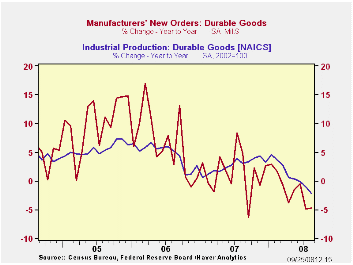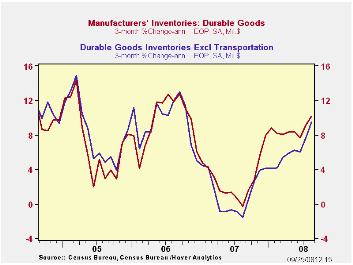 Global| Sep 25 2008
Global| Sep 25 2008U.S. Durable Goods Orders Show Broad-based Decline Last Month
by:Tom Moeller
|in:Economy in Brief
Summary
New orders for durable goods fell 4.5% during August and that reversed all of the downwardly revised, modest increases during the prior two months. Last month's decline certainly reflected a 38.1% (+31.1% y/y) plunge in orders for [...]

New orders for durable goods fell 4.5% during August and that reversed all of the downwardly revised, modest increases during the prior two months. Last month's decline certainly reflected a 38.1% (+31.1% y/y) plunge in orders for commercial aircraft, but elsewhere orders also fell sharply. Consensus expectations had been for a 1.5% decline in orders last month.
Less the transportation sector altogether, durable goods orders fell 3.0% after a downwardly revised 0.1% July uptick. Expectations had been for a dip during August. On a three-month basis growth in orders less the transportation sector fell to -1.5% (AR), the weakest since late last year.
August orders for nondefense capital goods fell 7.5% paced by the plunge in orders for commercial aircraft. Nevertheless, without aircraft nondefense capital goods orders dropped 2.0%. That lowered the three-month growth rate to -0.2%, it's worst since early last year. During the last ten years there has been an 80% correlation between the y/y gain in nondefense capital goods orders and the rise in equipment & software spending in the GDP accounts. The correlation of the GDP figure with capital goods shipments is, as one would expect, a larger 92%.
Outside the transportation sector, new orders were weak led by a 6.2% plunge in new orders for machinery. These orders still were up 5.2% y/y but three-month growth fell to -0.9%.Primary metals orders also turned weak as they posted a 9.3% (+12.0% y/y) drop which reversed virtually all of the gains during the prior two months. New orders for electrical equipment also fell a sharp 2.2% -1.2% y/y) after the downwardly revised 8.2% July shortfall. On a three-month basis these orders were down at a 20.8% annual rate.
The 1.9% August rise in new orders for computers & electronic products belies the weakness that has developed in this sector. On a three-month basis these orders fell at a 6.7% rate after a 2.1% decline during all of last year. Orders for just computers & related products increased 2.0% (-14.8% y/y) after a downwardly revised 13.2% July plunge. New orders for communications equipment were stronger and they posted a 4.6% (1.3% y/y) increase. Three-month growth amounted to 5.5%, a recovery from last year's 7.5% decline.
Overall shipments of durable goods fell 3.5% (-2.6% y/y) and that reversed a 2.3% July increase. During the last three months growth is a negative 1.7% (AR) after last year's negligible 0.1% uptick. For comparison, industrial production of durable goods during the last three months is -3.0% (-2.2% y/y). During the last ten years there has been a 79% correlation between the y/y change in shipments of durable goods and the change in durables industrial production. Less transportation, shipments of durable goods reversed all of their July increase and fell 2.1% (+2.1% y/y). Three-month growth was 2.2% (AR), down from 5.9% in January.
Inventories of durable goods again were strong and they rose 0.7% (8.1% y/y). Three-month growth amounted to 10.2% (AR), the strongest rate of accumulation in roughly two years. Less transportation, inventories also rose a strong 0.7% (5.9% y/y) and the three-month growth rate amounted to 5.9% after the 1.4% rise during 2007.
| NAICS Classification | August | July | Y/Y | 2007 | 2006 | 2005 |
|---|---|---|---|---|---|---|
| Durable Goods Orders | -4.5% | 0.8% | -4.7 % | 1.4% | 6.2% | 10.2% |
| Excluding Transportation | -3.0 | 0.1 | 1.4 | -0.3 | 9.1 | 9.1 |
| Nondefense Capital Goods | -7.5 | 3.5 | -1.9 | 3.5 | 9.4 | 17.3 |
| Excluding Aircraft | -2.0 | 0.4 | 1.9 | -2.7 | 10.7 | 11.6 |
Tom Moeller
AuthorMore in Author Profile »Prior to joining Haver Analytics in 2000, Mr. Moeller worked as the Economist at Chancellor Capital Management from 1985 to 1999. There, he developed comprehensive economic forecasts and interpreted economic data for equity and fixed income portfolio managers. Also at Chancellor, Mr. Moeller worked as an equity analyst and was responsible for researching and rating companies in the economically sensitive automobile and housing industries for investment in Chancellor’s equity portfolio. Prior to joining Chancellor, Mr. Moeller was an Economist at Citibank from 1979 to 1984. He also analyzed pricing behavior in the metals industry for the Council on Wage and Price Stability in Washington, D.C. In 1999, Mr. Moeller received the award for most accurate forecast from the Forecasters' Club of New York. From 1990 to 1992 he was President of the New York Association for Business Economists. Mr. Moeller earned an M.B.A. in Finance from Fordham University, where he graduated in 1987. He holds a Bachelor of Arts in Economics from George Washington University.
More Economy in Brief
 Global| Feb 05 2026
Global| Feb 05 2026Charts of the Week: Balanced Policy, Resilient Data and AI Narratives
by:Andrew Cates






